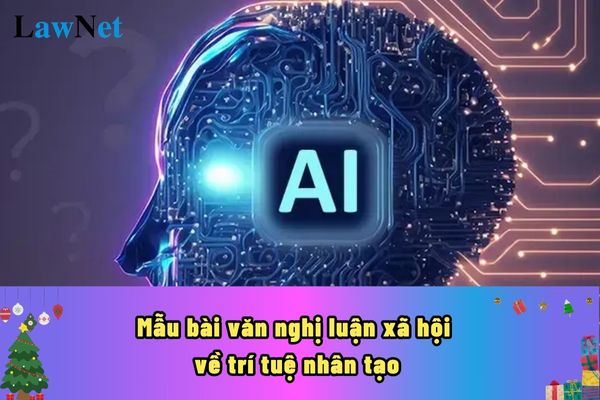Vietnam: What are the sample social argumentative essays on artificial intelligence? What is the grade at which students initially write social argumentative essays?
What are the sample social argumentative essays on artificial intelligence in Vietnam?
Students can refer to some sample social argumentative essays on artificial intelligence in Vietnam below:
|
Sample social argumentative essays on artificial intelligence in Vietnam
|
Note: The sample social argumentative essays on artificial intelligence in Vietnam are for reference only./.

What are the sample social argumentative essays on artificial intelligence in Vietnam? What is the grade at which students initially write social argumentative essays? (Image from Internet)
In Vietnam, what is the grade at which students initially write social argumentative essays?
Under Subparagraph 2, Section 5 of the General Education Program for Literature issued together with Circular 32/2018/TT-BGDDT, the content of the 7th-grade Literature curriculum is as follows:
Writing Process
Know how to write texts ensuring the steps: preparing before writing (identify the topic, purpose, collect materials); find ideas and outline; write the article; review and edit, and gain experience.
Writing Practice
- Be able to write a narrative essay recounting true events related to a character or historical event; a paper using descriptive elements.
- Be able to write an emotive essay (about a person or event).
- Initially able to create a four-syllable or five-syllable poem; write a passage describing personal feelings after reading a four or five-syllable poem.
- Initially be capable of writing an argumentative essay on a life issue presenting the matter clearly and the writer's opinion (agree or disagree); providing clear reasoning and diverse evidence.
- Initially be capable of analyzing character features in a literary work.
- Initially be capable of writing a narrative document about a rule or law in a game or activity.
- Be able to write a clear, complete, properly formatted report.
- Be capable of summarizing a text as per length requirements, ensuring the primary content of the text.
Thus, 7th-grade students will initially write argumentative essays on a life issue presenting the matter clearly and the writer's opinion (agree or disagree); providing clear reasoning and diverse evidence.
What are the characteristics of 7th-grade Literature in Vietnam?
Under Section 1 of the Appendix, General Education Program for Literature issued together with Circular 32/2018/TT-BGDDT, the characteristics of 7th-grade Literature in Vietnam are:
- Literature is a subject within Language and Literature Education, taught from Grade 1 to Grade 12. At the primary level, this subject is called Vietnamese; at the lower and upper secondary levels, it is called Literature.
- Literature is an instrumental subject with aesthetic and humanitarian value; it provides students with communication tools, forming the basis for studying all other subjects and educational activities in school; it is also a crucial instrument for imparting beautiful cultural, literary, and national linguistic values; developing healthy emotions, humanitarian sentiments, altruistic and compassionate living,...
- Through the lively language texts and artistic images in literary works, by engaging in reading, writing, speaking, and listening, literature plays a significant role in forming and developing students' good qualities and core competencies to live and work effectively and to engage in lifelong learning.
- The content of the Literature subject is integrative, covering cultural, ethical, and philosophical knowledge... related to many other subjects and educational activities like History, Geography, Arts, Civic Education, Foreign Language, Science and Society, Experiential Activities, Career Orientation,… Literature is also closely connected to life; it helps students relate more deeply to daily life, and be able to connect and solve arising real-life problems.
- The core content of the subject includes basic and essential knowledge and skills about Vietnamese and literature, meeting the achievement requirements in terms of students' qualities and capacities at each education level; divided into two phases: basic education and career-oriented education.
- Basic Education Phase: The curriculum is designed according to main strands corresponding to reading, writing, speaking, and listening skills. Vietnamese and literary knowledge is integrated during the teaching of reading, writing, speaking, and listening. Text materials are chosen and arranged according to students' receptive abilities at each education level.
The goal of this phase is to help students use Vietnamese competently to communicate effectively in life and to learn other subjects and educational activities well; forming and developing literary competence, an expression of aesthetic capacity; while nurturing thoughts and feelings for students to develop in soul and character.
- Career-Oriented Education Phase: The curriculum consolidates and develops the outcomes of the basic education phase, helping students enhance their language and literary abilities, especially receiving literary texts; enhancing skills in creating argumentative and informational texts with more complex content and writing techniques; equipping practical knowledge of literary history and literary theory beneficial to reading and writing about literature; continue nurturing thoughts, feelings, soul, character for students to become responsible citizens. Additionally, each year, students oriented towards social sciences and humanities choose to study several learning topics.
These topics aim to reinforce knowledge about literature and language, apply knowledge to practice, and satisfy the interests, needs, and career orientations of students.

